|
145 High Street
38 Lower Street
 
Deal
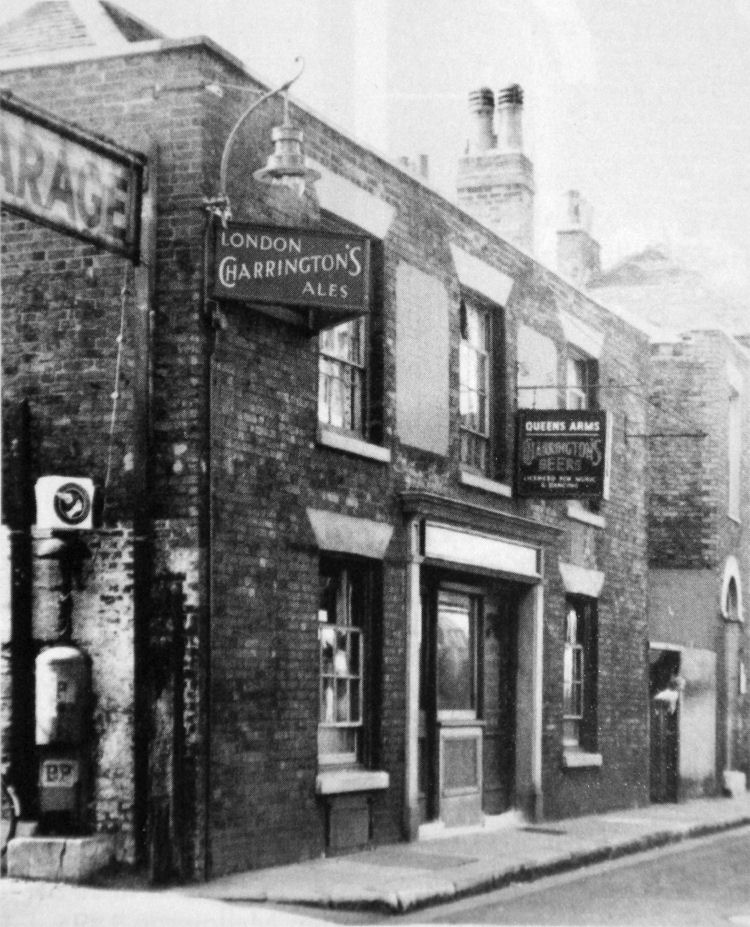
Above photo showing the Queen's Arms, circa 1955.
|
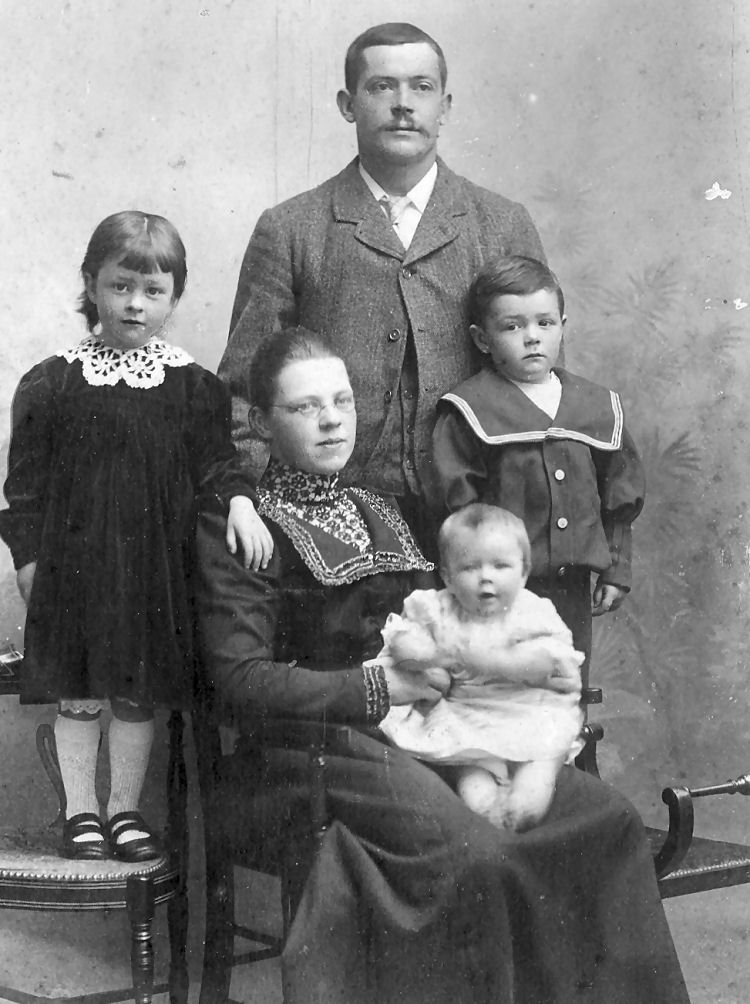
Above photo showing Edward Francis and Leonora Annie Robinson with their
children circa 1900. Kindly sent by Stephen Crowhurst. |
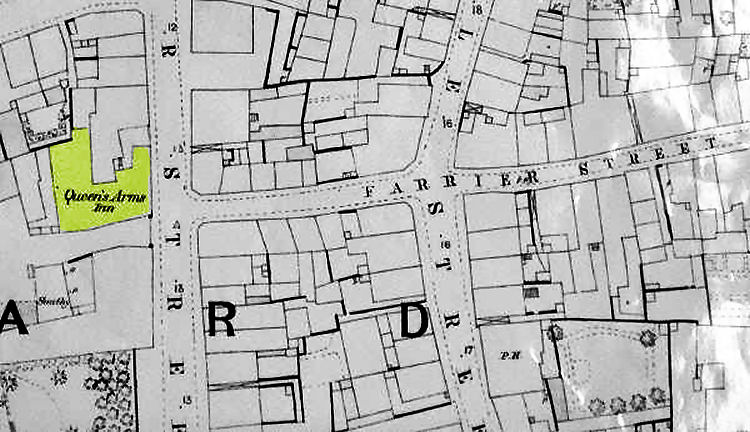
Above map 1870. |
Research suggests that this pub was formally the "Phoenix"
and changed name about 1821.
|
Canterbury Journal, Kentish Times and Farmers' Gazette, Saturday 12 April 1856.
Deal Quarter Sessions.
John Winch a travelling man, was charged with stealing a terrestrial
globe, the property of Mr. R. Lownds, of the "Queen's Arms Inn," value
4s. on the 1st of January last.
Mr. Towne, solicitor, of Ramsgate,
conducted the defence.
From the evidence that appeared that prisoner went to into Mr. Lownds'
at 3 o'clock, and left again about 4. Shortly after Mr. Lownds missed
the globe in question and immediately gave information at the police
office, which led to the prisoner's arrest. It seems that prisoner went
into Mr. Folwell's, silversmith, to ascertain the value of the globe,
and afterwards into the "New Inn," stating that he had been to the
Crimea, and that the globe had been his conductor.
Mr. Towne addressed the jury and expressed his sincere belief that it
was a mistake.
The Recorder having commented on Mr. Townes defence, summed up, and
after a short deliberation the jury returned a verdict of guilty, and
the prisoner was sentenced to 1 months' hard labour.
|
|
South Eastern Gazette 07 December 1858.
TO PUBLICANS AND OTHERS. TO BE LET.
The "Queen's Arms Inn," Deal.
For particulars apply to R. R. Lownds, on the premises.
RAMSGATE TO LET.
With Immediate Possession.
A Beer and Eating House, in a central part of town, making up 12
beds.
For particulars apply to H. H., the "George William," King-street,
Ramsgate.
|
|
From the Deal, Walmer, and Sandwich Mercury,
16 October, 1869. 1d.
A MAN ACCIDENTALLY POISONED
Yesterday (Friday) morning G. Mercer, Esq., Coroner, held an inquest
at the Town Hall on the body of a man unknown, but whose name was
supposed to be John Johnson, a wayfarer, who had been found dead in a
water closet at the "Queen's Arms Inn," Lower Street, on the previous
evening. Mr. W. Fells was chosen foreman of the jury, and the body,
which presented a very emaciated and half-starved appearance, having
been viewed, the following evidence was adduced:-
Mr. W. Burville Mackie deposed: I was walking in the Sandhills
yesterday, about a quarter to eleven o'clock, and met a person coming
towards Deal. It was the same person whose body had just been viewed at
the "Queen's Arms." He was eating something white at the time, but I
don't know what it was. My dog ran up to him and he patted it. I called
the dog away, and after the man had got a few yards away I saw him
stumble and fall. He picked himself up again, however, directly, and
then went on his way. I went down in the Marshes and got back again
about a quarter to one or so to one o'clock, and I then fell in with him
again near Sandown Castle. He was walking towards the Castle and I went
across the field.
P.C. Spicer said: Yesterday, about ten minutes or a quarter past one,
I saw the deceased near the "Fawn" beer-shop in Lower Street, near the
bottom of Bridge Row. He crossed the road to a garden fence and he
appeared to be retching and bringing something up. He stopped there a
few moments, and then walked steadily along Lower Street, and the last I
saw of him was when he got near Alfred Square. I did not see him after
he got to Alfred Square. I did not speak to him. He seemed to walk
slowly, and as he staggered a little I thought he had been drinking.
By the Foreman: He did not appear to require any help or looking
after.
Sarah Cunningham, widow, was the next witness. She said: I live at No
12, Middle Street, and go out to work. Yesterday I was at work at the
"Queen's Arms," and deceased came there for lodgings. Directly he got in
he called for two-pennyworth of gin at the bar. It was served him and he
drank it. After that he asked me to show him the kitchen, which I did.
He then wanted me to let him sit down by the fire, which I did. Whilst
he was sitting there he rather vomited and I gave him a spittoon,
but nothing came off his stomach but the gin he had just taken. I left
him and went to do my work, and when I returned about ten minutes I
found him sitting in another chair away from the fire. He then asked me
to lead him to the water closet, which I did, and as he staggered I led
him up by the arm, and I think if i had not done so he would have
fallen. I opened the closet door for him and led him in, but did not
assist him after he was in. I left him there and he shut the door. The
water-closet is in the yard close to where I was working, and if he had
groaned at all I must have heard him. I did not see him come out and I
went on with my work, and, in fact, forgot all about the matter. About
half-past four or five o'clock Mr. Marshall came in where I was at work,
just as we had done tea, and I told him about the man going into the
water-closet, which I remembered again then, and he at once went out
there. He came back in two minutes and said to me and his wife that he
thought the man was dead and that he should run for Mr. Parker, the
Superintendent of Police. I then went and looked and saw the man sitting
on the seat, resting his head against the wall of the closet, apparently
dead. I did not go up to him. When deceased came in he told me he had
been eating a mushroom and was afraid he had poisoned himself. This was
just after he had drunk the gin. He did not complain that anything was
the matter with him, he only said he had eaten the mushroom. I did not
tell Mr. Marshall this, but I did Mr. Parker.
The Foreman: How long was it after he came in before he went to the
water-closet?
Witness: About half-an-hour.
In answer to further questions witness said deceased was in the
closet about two hours altogether, and the only thing he said to her
after telling her about the mushroom was to ask her to lead him to the
closet.
The Coroner thought it remarkable that the witness should have
allowed so long a time to elapse between the man's going into the closet
and her speaking of it, but Mrs. Cunningham explained this by saying
that it frequently happened that persons were in the closet two and
three hours at a time, and that being occupied about her work she had
not noticed the matter.
Mr. W. James Marshall then deposed: I am the landlord of the "Queen's
Arms," public-house, Lower Street. About a quarter before five o'clock
yesterday I was in the bar, and Mrs. Cunningham came to me and said she
thought a man was out in the closet, and had been there two hours. In
consequence of this I went out to see if there was anything the matter.
When I opened the door, which was not quite closed, I saw the deceased
sitting on the seat, leaning against the wall, and at first thought he
was asleep, as travelling people often do go to sleep out there. I felt
his legs and found they were cold, and I then closed the door and went
in and said I thought the man was dead, and at once went for the police.
There were no marks of vomit on the floor, but deceased's shirt was wet
right up to the throat as if he had vomited. As soon as I found he was
dead, I thought it my duty to go for Mr. Parker at once.
Dr. Williams said: I am duly registered medical practitioner at Deal.
Yesterday afternoon about five o'clock I was called to the "Queen's
Arms," and I found deceased in a back room of the house lying on some
boards on the ground. On examining him I found that he was dead, and had
been, I should think, two or three hours, as he was quite cold at the
extremities. I heard from Mrs. Cunningham that deceased appeared as if
he was drunk, as she said, and that he had told her he thought he had
poisoned himself with a mushroom, in fact, just as she had given her
evidence to day. From the symptoms spoken of by P.C. Spicer, I should
also fancy deceased was under the influence of some narcotic poison -
possibly that of a poisonous mushroom. He had all the symptoms which a
poisonous mushroom would produce. The operation of poisonous fungi is
two-fold - in some cases they produce irritation of the bowels, pain,
colic, and diarrhoea; in others they produce all the symptoms of a
narcotic - giddiness, and confusion of vision. This would cause
congestion of the blood-vessels of the brain, and consequent death.
There are no marks of violence on the body, and I am of opinion that
deceased died from some poison, and very likely from eating what he
stated he had. The operation of the poison of a mushroom is very varied,
according to the idiosyncrasy of the person.
The Coroner having briefly gone over the evidence, the jury at once
returned a verdict to the effect that deceased died from poison
accidentally taken.
Several of the jurymen recollected having seen the deceased about the
town, and Mr. Marshall said he lodged at his house for one night about a
fortnight since, but had given no name. The only thing found by the
police on searching the body that at all pointed to his identity was a
night order for the Minster Union, which was in the name of John
Johnson, and dated 22nd September 1869. Deceased also had in his
possession a leathern purse containing 6d., an unused quill pen, and a
bundle of paper, a couple of maps of Essex and Kent, a copy of the
"Gravesend Guide," and a printed report of the Birbeck Benefit Building
Society. It was generally considered, from the appearance of the corpse,
that deceased had formerly belonged to some profession, and in his youth
had seen better days.
|
|
From the Deal, Walmer, and Sandwich Mercury,
11 December, 1869. 1d.
FELONY BY A WORKMAN
MONDAY:- Before the Mayor, E. Brown, J. Iggulden, and J. Hughes, Esqs.
James Ripley, 40, blacksmith, was brought up on suspicion, charged
with stealing a number of articles belonging to his employer, Mr. S.
Thompson, who carries on business in Lower Street.
P.C. Spicer said: I am one of the police-constables of Deal.On
Saturday night about midnight I was at the "Queen's" Arms" public-house,
having been called there by the landlord to clear the house. The
prisoner was there and left when we did, and I saw him again about a
quarter of an hour afterwards come down Duke Street. About two o'clock I
was standing besides Mr. Eastes', the news-vendor, at the bottom of
Farrier Street, and whilst there heard the snap of a lock. I looked
along Lower Street in the direction of Mr. Thompson's shop, and saw the
prisoner Ripley come out of the shop. I heard the lock go again as if he
were locking the door. I waited a second or two to see which way he was
going and saw him go towards Duke Street. I followed him and saw him
look round as he turned the corner. When I got round into Duke Street I
lost sight of him. There are several alleys in Duke Street and I
imagined he had got into one of them, and I whistled for assistance.
Sergt. Brothers came and we then went into the alley at the back of Mr.
Parker's, the butcher, and there found the prisoner lying on the ground
in the corner apparently asleep. Sergt. Brothers said to him, "Holloa!
what are you doing here?" and the prisoner replied, "I and my wife had a
few words and I came out again and laid down here." We both then looked
at the top of the fence, where we saw an iron kettle and a mason's iron
stove. We asked the prisoner what he had got there and he said, "They
are mine." Brothers then took them down, and I charged the prisoner on
suspicion of stealing them and told him I had seen him come out of Mr.
Thompson's shop, and he said, "Very well." I cautioned him in the usual
way, and told him that whatever he said I could state as evidence
against him, and that he need not say anything unless he liked. On
searching him when we arrived at the station-house I found these two
screw-drivers in his coat pocket. At nine o'clock the same morning I was
instructed by Sergt. Parker to go and search the prisoner's premises,
No. 5, St Andrews cottages, West Street, and accordingly went there,
accompanied by Sergt. Brothers and Mr. Thompson. On arriving there Sergt.
Brothers told the prisoner's wife that we had come to search the house.
I went to a lodge which adjoins the house at the rear, and in it I found
the following articles, viz., eight pieces of iron guttering (concealed
under the bench), twelve iron sash weights (various sizes), two shovels,
one flat iron (new), two Dutch hoes, one other hoe, one fork handle, one
hand hammer, one pair of smith's tongs, one rasp, and sundry files, and
other articles. Mr. Thompson was present and identified the things as
his property., and we brought them away and now produce them. Mr.
Thompson also identified the kettle and stove which we found in the
alley with the prisoner as his property.
Prisoner was asked if he had any questions to ask the witness, and
replied, "I say they are not Thompson's property."
Sergt. Brothers deposed: I went to P.C. Spicer in Duke Street, about
two o'clock on Sunday morning, and went with him into the alley which
turns out of that street, and we there found the prisoner as stated by
Spicer in his evidence. On the fence we found the two articles
specified, viz., the kettle and stove, which were claimed by the
prisoner. On searching him after he went at the station-house I found
the brass tap produced in his left-hand pocket. I went with P.C. Spicer
and Mr. Thompson to search the prisoner's premises and saw Spicer find
the articles mentioned in his evidence, and I also myself found in the
lodge a frying-pan and two broken skeleton keys; and in the kitchen I
found one tin pot and two tin dishes. When the things were brought to
the station-house Supt. Parker called the prisoner out of his cell and
told him they had been found on his premises and that he should further
charge him with having stolen them. Prisoner then disputed the guttering
and the hammer, and said he bought the guttering off Mr. Christian and
that the hammer was never on Thompson's premises at all. He made no
claim to anything else.
Mr. Samuel Thompson then deposed: I am a blacksmith and ironmonger at
Deal. I have a forge, store, and warehouse in Lower Street. They adjoin
each other, but only the store and warehouse are connected internally.
In the store or warehouse I had a quantity of iron and other goods for
sale. The prisoner has been in my service for five years, and was so up
to this occurrence. I have lately had occasion to suspect him and
therefore took precautions to prevent him going into the warehouse and
store. I have seen and examined the several articles produced by Sergt.
Brothers and P.C. Spicer, and I identify as my property the kettle and
the mason's stove. The brass tap I can't swear to - all I can say as to
that is that on Friday I had a couple of taps just like this one rolled
up together in brown paper, that I have not sold one, and that there is
now only one; therefore I have no hesitation in believing the one
produced to be my property, as it corresponds exactly with the other
one. I can't swear positively as to the shovels, but they are exactly
similar to those I have in stock and also bear the same label, and there
has been an erasure of the price, which was at precisely the same spot
as where my shovels are marked. The guttering I am also unable to swear
to but I believe it to be mine, as it is marked with rust just in the
same manner as that I have in store, as the water runs in at the place
where I keep it. Neither can I swear to the sash-weights, but I have
some in store similar to the smaller one produced, and which have the
same trade-mark. I can swear to the tin dishes by their mark, and about
15 months ago I missed a rasp which was exactly the same length as the
one produced. I spoke to Ripley about the rasp at the time, but he said
he knew nothing about it. Two of the hoes produced I believe from the
manner in which they are made were made for me by a man named Philpotts,
who worked for me before the prisoner came, and the other two I believe
Ripley made himself. Prisoner used to have the key to the forge, but
latterly he has not had access to the store. I think that all these
articles, which are similar to those I deal in and use, are my property,
but it is extremely difficult to identify every article; but to the best
of my belief the whole of the articles produced are my property. The
hammer I missed three years ago, and I believe it was made for me by a
man named Mount. I estimate the lowest value of the things to be about
£2 10s.
Prisoner denied that the hammer had ever been on Mr. Thompson's
premises, and he also reiterated the statement with respect to the
guttering. One of the small pieces produced, he said, he had purchased
off Mr. Thompson himself.
Mr. Thompson, however, said he had no knowledge whatsoever of the
matter.
The prisoner was then informed that the Magistrates intended
committing him for trial, and he need not then say anything unless he
pleased, but whatever he did say would be taken down in writing and
might be used against him at his trial.
After some hesitation the Prisoner said: All that I have got to say
is that the property does not belong to Thompson.
Mr. George Pilcher, wheelwright, of Wingham, father-in-law of the
prisoner, inquired if the Magistrates would take bail. At first they
seemed hardly disposed to do so, but ultimately consented, provided that
two sureties of £25 each could be found, and the prisoner was bound over
in £50.
The required sureties were not forthcoming, and the prisoner was
therefore taken to Sandwich gaol.
|
|
From the Dover Express and East Kent News, Friday, 1 January, 1932. Price 1½d.
MILL HILL WELFARE CLUB ROBBED – MAN CHARGED
Before the Mayor (Capt. C. P. Davis C.C.) and Alderman C. R. Darrocott
at Deal Police Court on Monday, John Watt (29), of 50, Cowdray Square,
Harold Shillabeer (25), of 26, Davis Avenue, Mill Hill, Sidney Stanford
Shillabeer, of 34, Cowdrey Square, and Frederick John Alexander (23), of
4, Crompton Terrace, Station Road, Walmer. Were charged with breaking
and entering the Welfare Club at Cowdray Square, Mill Hill, and stealing
two bottles of whisky, three bottles of rum, two bottles of gin, and one
part bottle of gin, one part bottle of brandy, one part bottle of
vermouth, 80 packets of various brands of cigarettes, in packets of 10,
and two packets of Woodbine cigarettes each containing 250 packets of
five, of the total value of £9, the property of the Welfare Club
Committee, at Deal, between 12.30 a.m. and 11 a.m. o December 27th.
P.S. Knight stated that at noon on the 27th December, in consequence of
a telephone message he went to the Welfare Club, where he found entrance
had been effected through a side window, which had been forced. He made
enquiries, and about 9 p.m. the same day, in company with P.S. Hills, he
again went to the Club and saw the prisoner Harold Shillabeer with
Alexander and Watt. He cautioned them and told them the nature of his
enquiries, and asked them to account for their movements the previous
night. They each made a statement which they signed. Shillabeer said: “I
and three chums left Deal about midnight and walked up to the Welfare
Club in Cowdray Square. We were all the worse for drink. When we got to
the Club we talked it over, and we decided to break in and steal some
drink and cigarettes. I broke into the Club with a man whom I know as
“Jock.” The other two remained outside, and we handed the bottles out of
the window to them. We shared it out between us, and we drank some and
took the remainder to my lodgings. We all remained at my lodgings until
the bottles were empty. I still have some of the cigarettes at home.”
The other prisoners' statements were as follows:-
Alexander said: “I was in the “Queen's Arms” last night, the 26th. We
went up to the Sea Front some time after midnight. We walked up Mill
Road, and about 1 a.m. we broke into the Club and got bottles of spirits
and some cigarettes. There were four of us. We shared the cigarettes and
drank the spirits.”
Watt said: “I came up Mill Road some time last night. I was drunk. Four
of us came up the road together. We came to the Club with the idea of
getting a drink, but when we arrived the Club was closed, so we got in
and took some drink and drank it.”
Witness added that about 11 p.m. the same day he went to 34, Cowdray
Square, where he saw the prisoner Sidney Stanford Shillabeer. He was
cautioned, and when asked to account for his movements, made and signed
the following statement: “I came up Mill Road about 1 a.m. with my
brother and two others whom I know as Fred Alexander and “Jock.” I left
them on the corner of Cowdray Square and went home.” Witness then went
to a house in Davis Avenue, where the prisoner Harold Shillabeer was
lodging and recovered a quantity of various brands of cigarettes. At the
Police Station prisoners were again cautioned and charged with being
concerned together with breaking into the Welfare Club and stealing the
articles enumerated in the charge. They all stated there were two
bottles of whisky too many in the list. They admitted taking the rest of
the stuff, and that they had 36 packets of cigarettes mentioned in the
charge. All they had was 12 packets each.
The only evidence taken was that of arrest by P.S. Knight, and the
defendants were remanded in custody to the Petty Sessions of Thursday.
On Thursday all four prisoners were committed for trial at the Quarter
Sessions.
|
|
THE QUEEN'S ARMS INN
by Philip E Robinson (April 1983)
My Grandfather was the landlord of this inn from about 1885-1895. My
father, Mr E F Robinson took it off him and continued as tenant from
1895-1916.
This was an inn and as such, bound to provide accommodation and
refreshment. Even on a Sunday, when the bar was closed for a few hours,
as long as a traveller could prove be came from over 3 miles away, he
could claim refreshment.
The inn was of fairly small frontage but great depth, most of the rooms
leading off a long central passage.
In the front was a bar and living room, almost all in one, with just a
curtain between. No seating in the bar. On the other side of the the
passage in the front was the tap-room, which had a large table and some
chairs for the convenience of people who would like to sit down. This
was, however seldom used, and was latterly used as a sitting when the
family appeared. My mother and father were both between 20 and 21 when
they were married and took over the inn, and whilst there, seven
children were born.
A small scullery with no sink or water laid on, was at the back of the
bar, though this lack of water was remedied later. From the scullery,
steps led down to a cellar which ran under the two front rooms and
partly under the pavement. This was earth-floored and held stock.
Moving towards the the back of the house, on the left of the passage,
was the lodgers' mess room. This was at a rather lower level, two steps
down from the passage. The floor at this was covered with sea sand.
Further down the passage at the rear of the building were two
dormitories, one on either side.
At the back was a big cobbled yard with outhouses and lavatories. In the
outhouses was a sink, a huge copper for boiling clothes, a water butt
and tap, also lockers for the lodgers to keep perishable food in ex.
There was also a coal and wood store. Coal, incidentally, was £1 per
ton.
From the back yard an alley led into Duke Street, also to the stables
belonging to the inn. The main entrance to the sables being in Duke
Street.
During the tenancy of our family, no horses were stabled, but they were
let to Mr. Harry Hayward, a boat-builder, whose house was in Middle
Street. The mangers and hayracks were still in position in 1916, as far
as the writer knows. Mr. Hatward built good boats and was helped by his
son. The writer felt very proud when at times he was allowed to assist in
"clinching" the copper nails. The normal price for a 14 foot punt, as
used on Deal beach in those days, was £12.
Incidentally, on the outhouses, was a fine growth of House leek, or
Semper vivum.

The living room of the family was adjacent to the bar, screened from it
by a 3 foot wide matchboard partition, and the rest by a curtain. All
conversation in the bar could be heard in the living room. This room was
about 10 by 9 feet and in it we lived. There was not much furniture
because there was not much room, a table, a few chairs, a bureau, and a
couple of big cupboards on the wall. A naked gas jet, and a coal range
on which all cooking was done and water heated. In the evening when we
were ready for bed, we washed in a big bowl on the table, and then in
our night-dresses we had to walk through the bar, amongst the customers
into the passage, from whence a staircase led up to our bedrooms over
the front of the house. It amused the customers and we did not think it
unusual, for we had grown up with it.
LODGER'S MESS ROOM
As mentioned before, this room was at a lower level than the passage,
a large room about 20 by 14 feet. The floor was wood and was kept clean
and fresh with sea sand. In general charge of this room was my father's
deputy, a man who kept order. He kept it tidy, tended the fire, kept the
kettles filled with water. Also sometimes he would wash clothes for some
of the lodgers and probably act as cook if required.
The room was furnished with two big wooden tables made of elm, 4
wooden forms and a few chairs, utility, not comfort, being the keynote.
There was a huge cupboard on which the lodgers kept their stocks of tea,
sugar etc., also the communal crockery. Incidentally, the tables and
chairs were scrubbed every night by the landlord after the bar was
closed, probably about 11.15 p.m.
There was a large open grate which burned coke and was generally kept
well stoked up, for on this the lodgers cooked all their meals. Coke was
4d. per bushel at the time of which I am writing. On the hob were
usually kept boiling two big iron kettles holding a couple of gallons
each. There were also two large oval iron cauldrons which were used for
soap making, and a large iron frying pan with which most of the cooking
was done. Basins for drinking, also cutlery and crockery were supplied.
The lodgers cooked and ate all their meals in this communal mess room.
DORMITORIES
The dormitory on the right of the passage held 12 single beds, six a
side with a wooden table down the centre, there were also chairs and
chambers supplied. Iron bedsteads, some beds stuffed with oat chaff and
some with feathers, the usual number of sheets and blankets as required.
Incidentally when my mother and father took over, they increased the
number of beds. My father bought a sewing machine and my mother spent
the first few days making sheets from unbleached calico.
The dormitory on the left, had six beds, a table and the usual
furnishings.
Upstairs there were four bedrooms for lodgers, double beds for
married couples, and one with a single bed. There were three bedrooms
over the front for the family, which were locked away from the lodgers
quarters. My father was mindful of fire precautions, for in my parents'
room was a home made rope ladder, which would fasten on to hooks on the
wall under the window sill.
The rent of the inn paid to the brewers (firstly Messrs. Hills and
then Messrs. Thompson, the Walmer Brewers) was £16 per year, also rates
and taxes.
PRICES FOR LODGING
A bed in a dormitory was 4d per night. He single room upstairs was 6d
per night, and double rooms 8d per night.
BAR PRICES
Beer and porter drawn from the cellar by engine was 2d per pint. Old
ale and bitter which had to be brought by hand from the cellar - old ale
4d and bitter 3d per pint.
My father was noted for his old ale, probably because he never tapped
it under 3 months, and preferred to keep it longer before sale. Some
folk swore by it for stomach trouble, and people used to come for it
from Walmer and Kingsdown. Gin, rum and brandy was sold over the counter
at 1/- per half pint. The normal call over the counter was for two
pennyworth of any spirit.
Very little bottled beer was kept, except for a few customers, to
whom my father delivered.
There was also a big stock of clay pipes which were given free to
customers on request. These pipes cost 1/- per gross and were made by
Mr. Harrison who lived in Beach Street just at the back of the "Port
Arms."
Shag tobacco was 4d per once, Woodbines 5 for 1d. Brimstone matches
were bought from the shops at 2d per dozen boxes.
OPENING HOURS
From 7 a.m. to 11 p.m. weekdays. On Sunday 12 noon to 2 p.m., and 6
p.m. to 10 p.m. But if a traveller came along on Sunday he could be
served at any time.
There were some early morning callers on weekdays, who came in for
twopenny worth of rum and a ha-porth of milk.
Also sold in the bar were big round hard, crisp biscuits. These were
about 5" diameter and were made by Mr. Selth, a baker on the South
corner of Coppin Street and Middle Street. These were of the texture of
a ship's biscuit, and eaten with a piece of cheese and a glass of
bitter, were very tasty. This was often called for at the bar.
My father had a long day. He opened the bar at 7 a.m. By 9 a.m. all
the lodgers would be up, and he would turn down all the beds in the
dormitories, open the windows and clean and sweep up. My mother, in the
meantime, would have got the breakfast, the children to school, and the
usual housewifely duties, at the same time tending the bar. During the
rest of the day my father would serve at the bar. My grandfather would
sometimes come in from 10 a.m. to noon whilst my father looked after his
allotment, which was situated at the level crossing near the Potteries.
We always kept a punt on the beach at the opening near the Pilot House,
and sometimes he would go off fishing for a couple of hours, when
grandfather came down, I generally went with him when it was school
holidays or on a Saturday. I would dig the bait the day before. Of
interest to the younger generation is the fact that one could always go
opposite the Coastguard Station at low tide, whether at "Springs" or
"Neaps" and dig plenty of common lug. No need to go further North. At
the Equinoxes, the writer has dug log off Farrier Street.
During the evening, my father was always busy at the bar till 11
p.m., when it was cleared and the door closed. The bar would be locked
up and my father would then scour the tables and chairs in the lodgers'
mess room, and then to bed. A woman came in once a week and washed
sheets in the outhouse, blankets were washed in the summer.
About dinner time quite a few people would come in for jugs of beer
to take home, and there were some regulars to whom my father delivered
jugs of beer or porter, most days.
At 11 a.m. or thereabouts on most mornings, there were regular
customers for a "schooner" of bitter, in much the same way as coffee is
now taken. These regulars were mostly nearby tradesmen. I can remember
two butchers coming with their aprons on, a greengrocer, a baker and a
blacksmith. Just a short chat and away to their business again. In the
evening, the patrons would be the usual callers with some of the
lodgers.
LODGERS
These were a real cross section of the community. Some were regulars
who made their homes there. Amongst there were 5 Deal boatmen - Tom
Kemp, "Chummy" Hayward, "Shoreham" Shelvey, "American" Dave Foster, and
Tom Buttress. Also among the regulars were 4 farm labourers and 3 fish
hawkers. Also there ere those who made their living from the fields and
country in general, i.e. water lilies, and the different spring and
summer flowers such as primroses, cowslips and king cups; also
blackberries. In the winter one man used to get the sharp thorns from
blackthorn. In the evenings he would scrape off the black covering and
sell the white spikes to the local butchers, who used them for spiking
the price tickets to joints. The scrapings of the thorn were used to
make a palatable brew which they called Jerusalem tea. The writer has
watched these thorns being scraped, many times, and once tasted the
brew, but after this passage of time cannot recall the taste.
The transient lodgers were of many kinds. Among them being painters,
who followed the towns around, where there was plenty of work. Also
hawkers, who peddled baskets of haberdashery and probably stayed only a
few days. Also travelling tinkers and china riveters. These seemed to
come about the same time every year, and generally had a handbarrow. It
was a sif they had a regular round in this part of the country.
Especially in the summer months there was usually an organ grinder
staying there, one Italian stayed a year.
These also would usually come round yearly at about the same time.
There was a German string band which usually came in the summer, a
sextet, which played in the streets and must have gained a fair living.
Also a regular one summer was a hapist named Prospero, who played in an
orchestra having a summer season on the pier.
During the summer months there was an influx of travelling
pea-pickers, and the occasional fruit pickers in the autumn.
There were three different saw-sharpeners.
The lodgers who were out all day generally made a goo breakfast and
evening meal, mostly fried. For 3d in those days one could get a fair
amount of bacon or meat pieces and these with an onion made a tasty
meal. With bread and a pot of tea they were well fed. In the autumn,
herring and sprats were a cheap and satisfying meal, when one remembers
that when planty of herrings were being caught, they were hawked around
the town at 48 for 1/-, sprats 4d a 100, or often given away for a
helping hand in heaving up the boats. My father reckons that at these
times there were easily 1000 sprats a day being cooked. Sometimes in the
winter, when times were hard, a most excellent jug of soup could be had
at the soup kitchen in brewer Street. My mother has also made a huge
cauldron of soup for the needy ones.
The regular lodgers were, without exception, orderly and hard
working.
At the time of which I write, Deal had 4 lodging houses, generally
fairly well filled. The "Queen's Arms," "Noah's
Ark" in Ark Street, the "Jolly
Sailor" in Western Road and the "Maxton
Arms" in Western Road.
In the beer cellar under the pavement was an arched vault or
passageway leading both North and South, but after some 6 yards either
way, this was bricked up. What lay beyond no-one seemed to know. Under
the dormitories at the rear of te building was a huge cellar extending
the width of the building. This had an earth floor and a chimney breast
at either end and was approached by steps leading out of the lodgers'
mess room. Again I could never find out if this had even been used.
In the alley leading into Duke Street there was a rain water well or
tank, with a pump. Also in the yard was another well or tank covered by
a stone slab, with no pump.
In the opening between the Inn and the present garage was a coach
builder's premises, the owner's name being Burgess. In the days of which
this was written, the business slowly deteriorated and the premises were
taken over by a firm of mineral water manufacturers named Souter
Mackenzie. In the adjoining cottage on the north side lived old Mrs.
Nancy Budd and her invalid husband, the grandparents of those well known
Deal boatmen - George, Darky and Bill Budd.
I suppose no description of licensed premises at this period would be
complete without some mention of dutiable goods. Tobacco could be bought
in our bar. My father would buy cake tobacco at 2/6 per 1lb, this was
called Yankee Cake and as the name implied, was in flat oblong cakes.
These went 13 to the pound and they were sold for 3d each. There was
also shag in packets, and cougars with 50 in a box. My father well
remembers a Canterbury man coming in one day with about half a bushel of
tobacco and cigars in a sack. He was taking it back to Canterbury to
raffle for Xmas.
My father joined the army in 1914, and with some assistance, and my
eldest sister, my mother carried on till 1916. It then became more than
they could manage, and they gave up the tenancy.
A short history of this kind would not be complete without some
mention of the family concerned with the old inn. The writer, one of the
sons is writing in the first person, so there should be no confusion
over the generations.
Paternal Grandfather Robinson was born in 1845 of an old Deal family
closely connected with the Roberts of North Deal, who was second
coxswain of the lifeboat.
Paternal Grandmother was born in 1848 in the old "Woolpack Inn,"
North Lane, Canterbury. Her maiden name was Stroud.
Granfather had three brothers, Ted and Harry were brick-layers like
himself, and Bill was in the Navy. Bill deserves some mention bacause
his entry into the Navy was unusual. At that time a public house called
the "Harp" stood in Middle Street,
between Oak and Brewer Streets where a fish and chip shop now stands.
The landlord of this was a Mr. Desormeaux, who combined this with a
barber's business next door. Young Bill started here as a "lather boy."
One day a choleric old boatman was in the chair and annoyed Bill by his
irritability. Bill became so incensed that at last he jammed the lather
brush in the old chap's mouth, and fled from the shop to the beach -
straight into the arms of the Navy. He served in the Navy at the siege
of Sebastopol in the Crimean War, was eventually on the Australian
station and deserted there. He returned to Deal many years later and
finished his active life as a boatman. He was well known for his
drinking powers. In those days, money was scarce between "hovels" and
the men used to have their beer "on the slate." Bill used the "Napier
Arms" and ran up a tidy score. He knew how much he had though, and
one day when he called for a pint, said "Landlord, that just makes a
barrel."
Grandfather stayed with us for a while just after we were married,
and told us that as a young man, he walked to Guston and back each day,
to work. It was about a 12 hour day. He could also tell of the great
gale of February 1870, when every ship except one, was driven ashore. He
was also quite a good performer on the Jew's Harp, an instrument never
seen these days. He and Grandmother were married in 1871.
My maternal Grandfather Belsey was born in Canterbury and was a coach
painter by trade.
My maternal Grandmother was born in Bury St. Edmuns in an army
barracks. Her father Barrettt was a Lifeguardsman, and was at that time
the tallest man in the regiment, 6 feet 6½ inches.
The Belsey's moved to Bromley, where he worked Messrs Chitty,
coach-painter. In those days, it was paint and rub down, paint and rub
down many times before it was a complete job. He was an excellent and
noted craftsman, and as such was entrusted with the most skilful jobs
such as lining the panels and painting the monogram. Our young family
spent many holidays there when I was a boy. He one thing I can remember
of Grandfather Belsey, is of a short man, surly and grumpy.
My father was born in Duke Street, in 1874, and my
mother in Canterbury in the same year, and they were married in 1894.
When father was about 10 years old, his parents
moved to the "New Inn" in Havelock
Street.
He was extremely good at drawing in those days, so
much so that he went to the Canterbury School if Art for a time. without
paying any fees. However, his parents showed no interest and he
eventually left. His drawings and paintings still at home testify to his
skill. His parents returned to Deal and took over the "Queen's Arms." He
joined the Garrison Artillery and was at Dover Castle for a time.
However, my grandparents wanted to retire in 1895,
so father bought himself out of the army, married and took over the
"Queen's Arms."
There were 11 children of the marriage, 6 girls
and 5 boys, 9 of whom are still alive, one boy dying in infancy. As I
mentioned earlier, some were born at the Inn and some at the Homestead,
Middle Deal Road. My father had this house built in 1902.
Father was a powerful chap in his young days. When
we came ashore from fishing, he would pull the boat up the beach by
himself, with some slight assistance from me, I was a lad of about 9 or
10 and I would lay the greased "woods" and "tail" on the painter with
him. the boat being a normal 12 foot punt.
He joined the National Reserve just prior to the
1914 war, it was composed of ex-army men. Their job as to guard railway
bridges etc. in the event of war. e was called up when war broke out and
served for a time around the Medway towns. He transferred to the Royal
West Kents and was eventually posted to Lowestoft. In the meantime,
mother carried on at the Inn with the help of my sisters Nora, but it
was too much for 2 women. They relinquished the tenancy, and mother
eventually went to Lowestoft to join my father and took a house near the
High Lighthouse. Father finished up as a Physical Training Sergeant at
the end of the war. Two sons were serving - one in the Navy and one in
the RFC. One daughter was in the WRAAC, one in the Land Army, and one
daughter-in-law in the QMAAC, and one son-in-law in the Army. The house
in Deal was let during the family's absence.
Father now had to find work and took a job in a
herring curing factory. After a time the family returned to Deal and
Father tried another couple of jobs, before being employed as a gardener
by the War Graves Commission, on the war graves in France. Mother
followed him and took a house at Fricourt. My sister looked after the
rest of the family, who were working in Deal. My two youngest sisters
went to the village school in France.
My parents eventually came back to Deal where my
father realised his ambition of working his own piece of land.
Some mention should be made of Mother's activities
during the First war after she had relinquished the tenancy of the Inn
and gone back to Middle Deal. Apart from looking after her young family,
she had soldiers billeted on her from time to time. She still managed to
keep the kitchen garden in good order, and exhibited in the local flower
shows. I remember coming home on leave and seeing the prize certificates
on the mantelpiece, firsts among them.
The family did their share during the second war.
Father was an enthusiastic air-raid warden all the time. Mother escorted
parties of evacuee children to their destinations. She assisted at the
Borough Restaurants at Tormore, and "Feed Thy Lambs" in Middle Street.
All 4 boys were in the forces, 3 as professionals. The two daughters who
served in the first war, joined up again and served in the ATS. It is
interesting to note that these 2 women join up again at the time of
Munich. Also in the forces were three sons-in-law, two grandsons, one
grand-daughter and her husband. One son had the distinction of having
himself, his wife, and two sons all serving at the same time. All the
family and in-laws did well in their chosen branch of the Service.
Life has been good to the family, Mother and dad
still with us, but we feel the loss of a son, son-in-law, a daughter and
a daughter-in-law.
Father was a good raconteur and often kept us
amused at family gatherings with his yarns of the good old days.
One interesting point. I mentioned earlier on that
Father brought Mother a sewing machine when they married. That machine
is still in use over 70 years later and still in good order.
The family is scattered but united. The last time
we had a gathering was on the occasion of our parents' 71st wedding
anniversary. We are all proud of our family, and would like to record
the admiration and esteem in which we hold our Father and Mother.
Grandma's 100th birthday celebrated 12th April
1974 at the "Clarendon Hotel," Deal, 63 descendants being present.
Further reading can be found at the following web site:-
http://home.freeuk.net/eastkent/deal/historic/robinson2.htm
|
|
From the Dover Express and East Kent News, Friday, 25
August, 1939.
An outing for the children of the Maple Leaf Glade, No. 48, took place on
Wednesday, when 34 children with 24 adults, proceeded to Deal by train,
leaving Dover at 1 o'clock. At Deal they went to the beach where, after
spending a very enjoyable afternoon, all went to the "Queens Arms" for tea,
catered for by Sister and Brother Rayner. After tea the children spent a
happy time at the fair. Prima Jones gave each child an ice cream, Prima
Brooker apples and Dame Hornsey sweets. Fruit was also given to them from
the proceeds of the children's funds. The day came to an end too soon, the
party arriving at Dover at 9.30.
|
|
Dover Express 18th May 1945.
Wingham Petty Sessions.
The Wingham Petty Sessions were held at Dover on Thursday before
Viscount Hawarden, Messrs. W. T. Morrell, A. T. Goodfellow and F. Turner and
Mrs. Plumptre.
Absentee fined.
Francis Rowley, Queen’s Arms” High Street, Deal, was fined £3 for being
absent on three occasions from work at Betteshanger Colliery.
Defendant said that he had nasal catarrh which gave him neuralgia but he
did not get medical certificates. It was stated that defendant had been
absent 45 times out of a possible 78 during October, November and
December last.
|
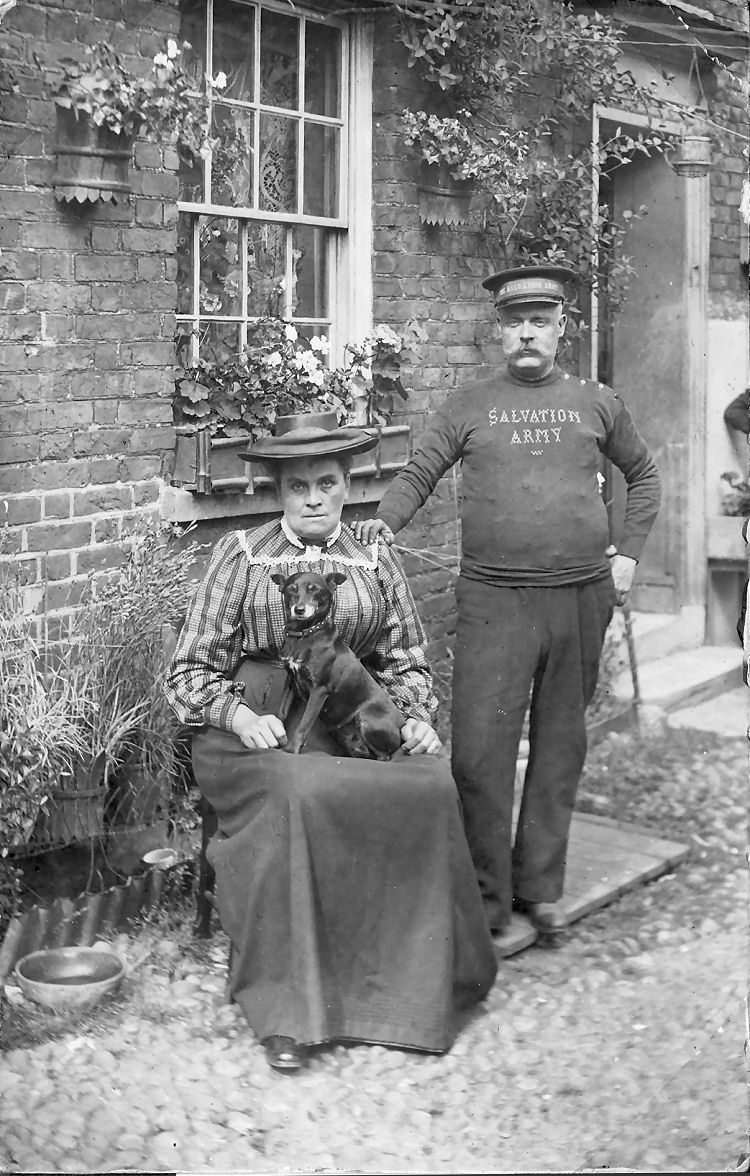
Above photo kindly sent by Stephen Crowhurst who says this was taken at
the back of the pub, circa 1910, and shows people called Bango Charlie and Mrs.
Hurst. |
|
From an email received 8 December 2013.
My Grandparents, George &
Linda Rowley were the last proprietors of the 'Queens Arms', Deal, 1938
onwards.
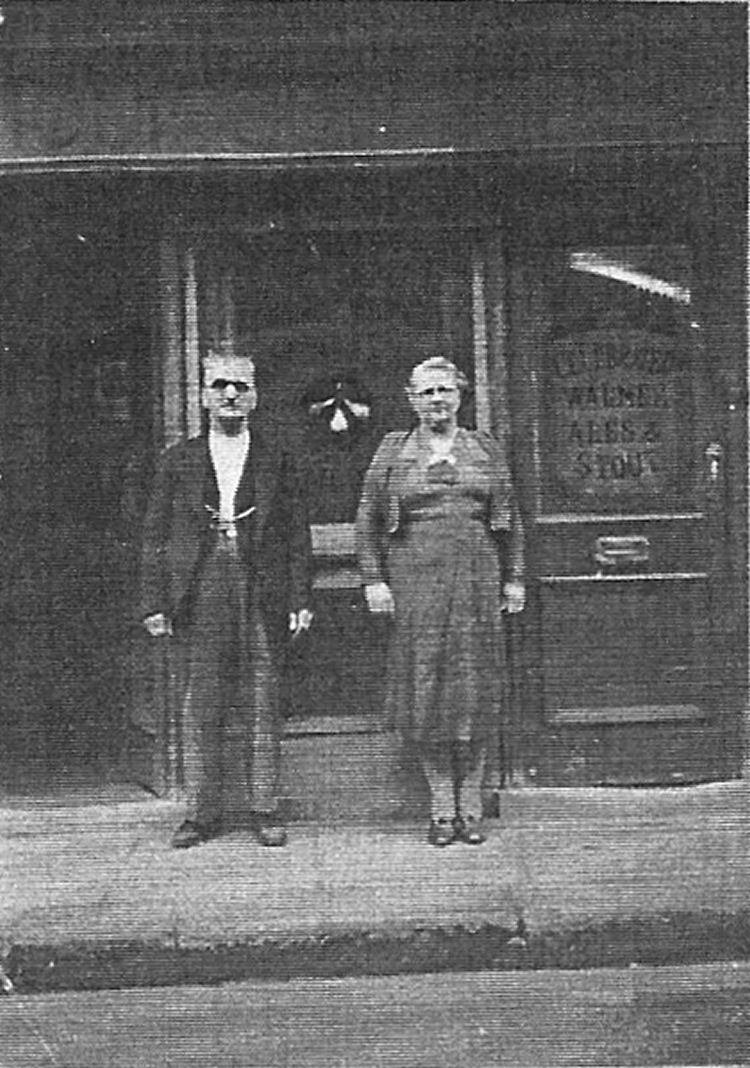
They were also the proprietors of the 'Majestic Hotel', adjacent to
the "Queens Arms," separated only area where the BP petrol pump stood.
Photo above and below taken circa 1950.
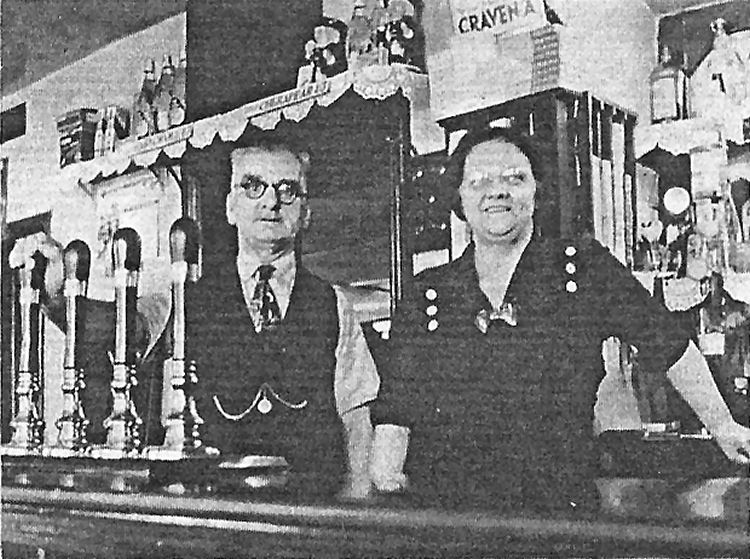
My Grandparents went
onto being the tenants of the 'Resolute' pub in Poplar, East London.
Prior to them moving to Deal, they managed a pub in Dover, the name
eludes me.
If you have any information on the 'Majestic Hotel', & which pub they
managed in Dover it would be greatly appreciated.
The family group photo, next to petrol pump, was taken in about 1946.
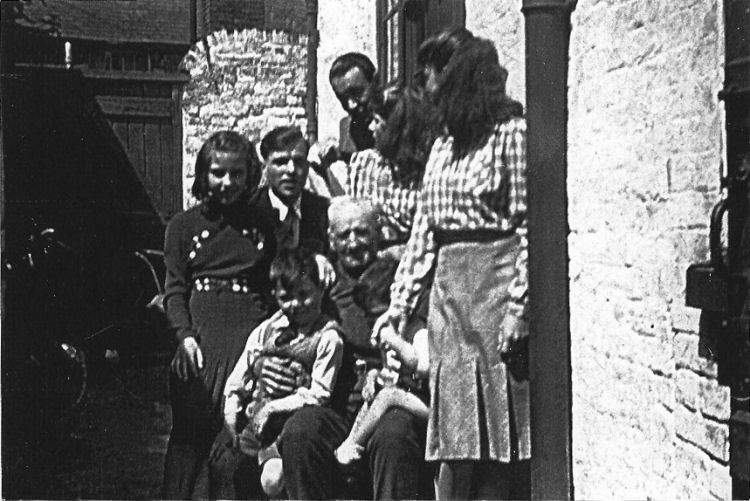
Dover District Council decided to widen the High St., from Leonards
Road to Water St. sometime in the mid 60's. This would entail
demolishing, among other properties, the 'Majestic Hotel,' the petrol
pump area, the 'Queens Arms' & No147 & No.173 where our family lived.
Kind Regards,
Mike Croskerry.
|
|
From an email received, 15 August 2016.
Hi
My Mum and Dad owned, ran and lived in the "Queens Arms" pub in Deal from
1959 to 1962/3 when it was demolished. They both belonged to the Licensed Victuallers Association. I have a picture of them behind the bar, a picture of Mum on a "Ladies
Auxiliary" visit to Park Royal Brewery. I also have a clock that was presented to them when they left
the "Queens Arms" pub. Shown below.
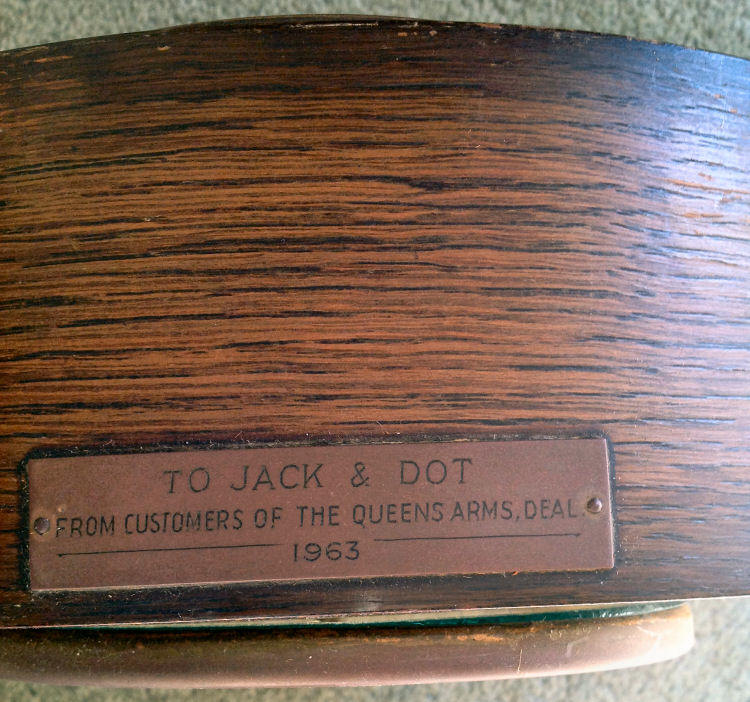
Regards,
Sue Wokersien. |
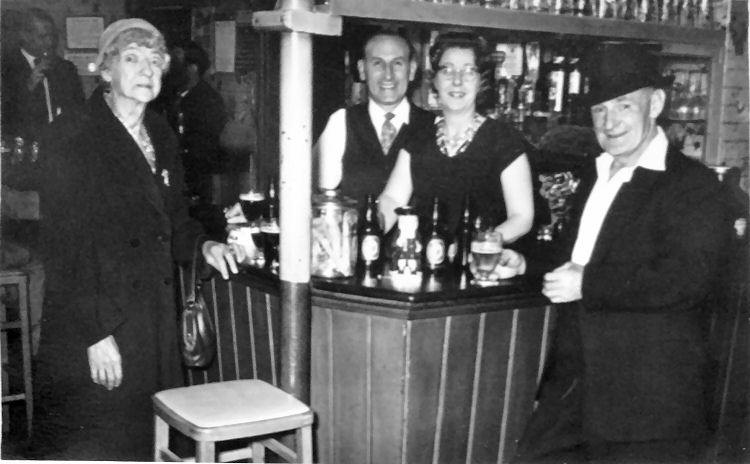
Above photo, showing Jack & Dot Cross behind the bar. Kindly sent by Sue Wokersien. |
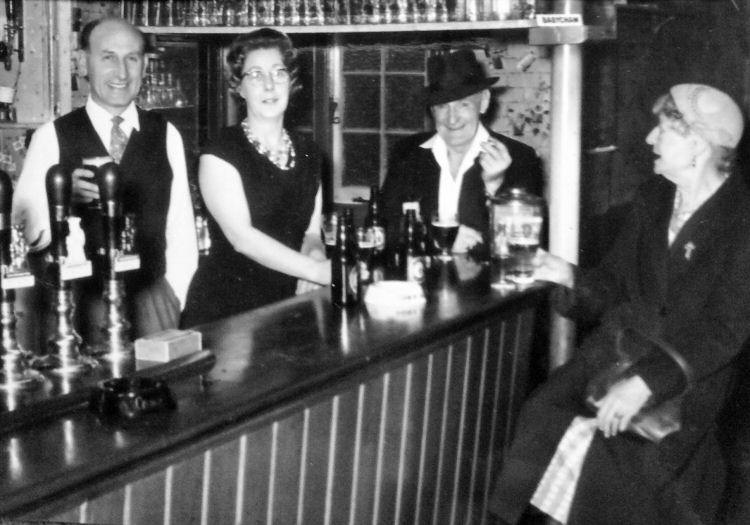
Above photo, showing Jack & Dot Cross behind the bar. Kindly sent by Sue Wokersien. |
The following information has kindly been sent to me from Stephen
Crowhurst:- According to the 1881 census Richard Henry Robinson is the
Licensee of the "Queens Arms Inn," Deal and the 1891 has him as the Licensee
of the "New Inn" Canterbury. They were
still in the "New Inn" on the 28th
April 1894 when there son Edward Francis Robinson left the Royal Artillery.
I was told that he bought himself out of the army to help his parents due to
illness. They then went back too the Queens Arms Inn Deal and eventually the
son Edward Francis Robinson took over the Licensee until he went to the
First World War and his wife Leonora Annie Robinson took over the Licensee
until it became too much for her and looking after 9 children.
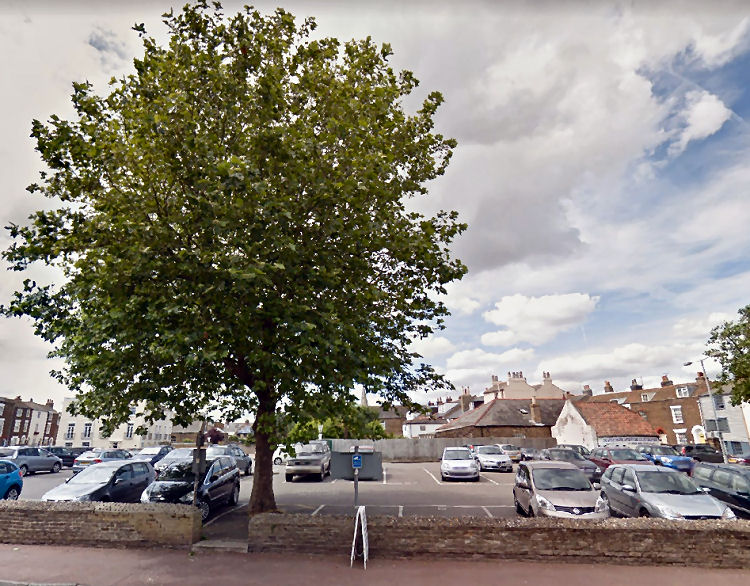
Above Google image, July 2015, showing the location. |
LICENSEE LIST
BROWN Matthew jun. 1821-29
MARTIN/MARTON Robert Thomas 1838-40+
 (Lower Street)
(Lower Street)
HOOKHAM John 1842-51+ (age 47 in 1851 ) )

LOWNDS Robert Ramell 1853-58+ (also tailor)
SHERLOCK Catherine 1859+
MORRIS William 1861+
MARSHALL William 1863-74+ (71 census)
ROBINSON Richard Henry 1881-84
 (age 34 in 1881
(age 34 in 1881 ) )

ROBINSON Edward Thomas 1884-1891+ (also bricklayer age 50 in 1891 ) )

 ROBINSON Richard Henry 1894-1903+ (brother of above) ROBINSON Richard Henry 1894-1903+ (brother of above)     
ROBINSON Edward Francis (son) 1915
ROBINSON Leonora Annie Mrs (Edward at war) 1914-16
GLADWISH William 1916+
SULLY/SOLLY Charles Henry 1922+

HADDOCK Mr 1929+
BRAGG William Charles 1934-38+
 
RAYNER Harry Jan/1938-41 (age 33 in 1939)
BROWN Harry 1942+
HEWETT Mrs R 1943+
ROWLEY George & Linda 1944-48+
GOLDSMITH F 1953+
CROSS Jack & Dot 1959-63
https://pubwiki.co.uk/QueensArms.shtml
 From the Pigot's Directory 1840 From the Pigot's Directory 1840
 From Bagshaw Directory 1847 From Bagshaw Directory 1847
 From the Post Office Directory 1874 From the Post Office Directory 1874
 From the Post Office Directory 1882 From the Post Office Directory 1882
 From the Post Office Directory 1891 From the Post Office Directory 1891
 From the Kelly's Directory 1899 From the Kelly's Directory 1899
 From the Kelly's Directory 1903 From the Kelly's Directory 1903
 From Pikes 1908 From Pikes 1908
 From the Post Office Directory 1913 From the Post Office Directory 1913
 Deal Library List 1914 Deal Library List 1914
 From the Post Office Directory 1922 From the Post Office Directory 1922
 From the Kelly's Directory 1934 From the Kelly's Directory 1934
 From the Post Office Directory 1938 From the Post Office Directory 1938
|











